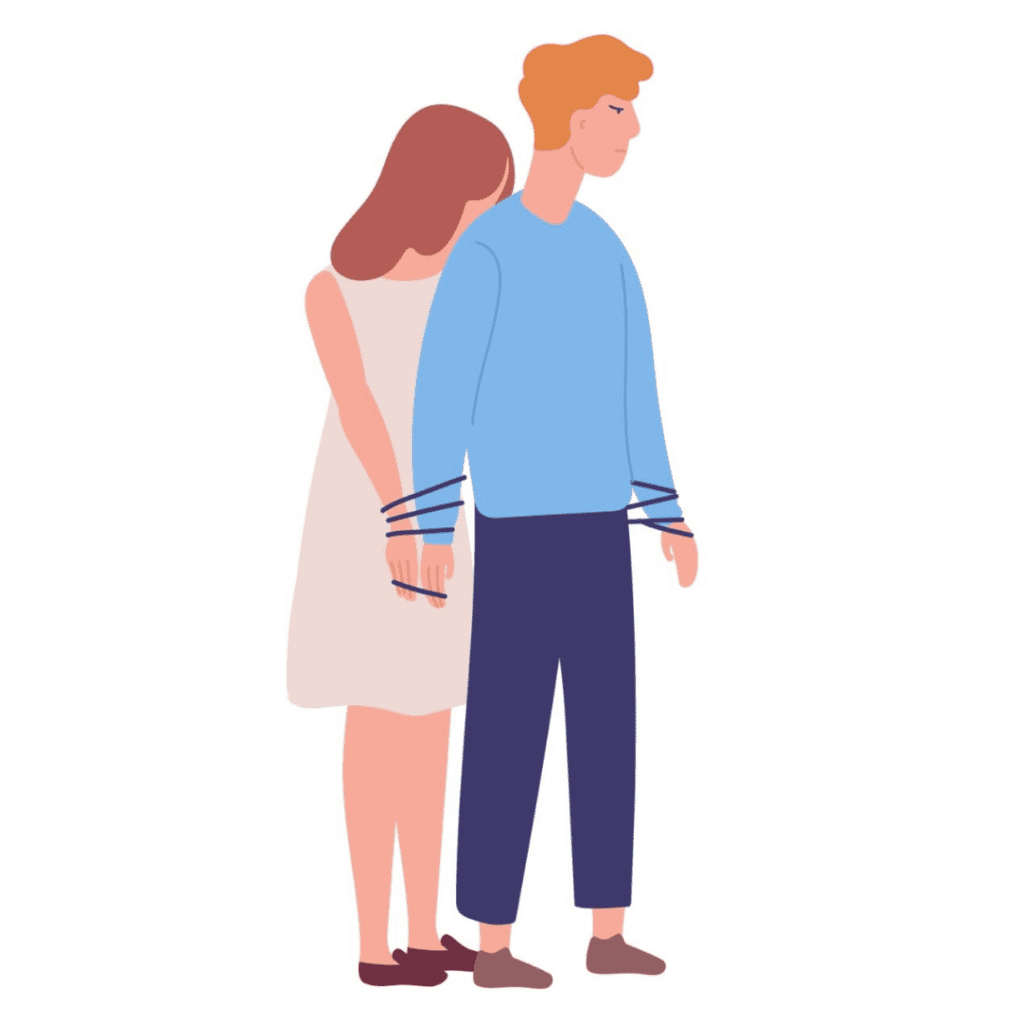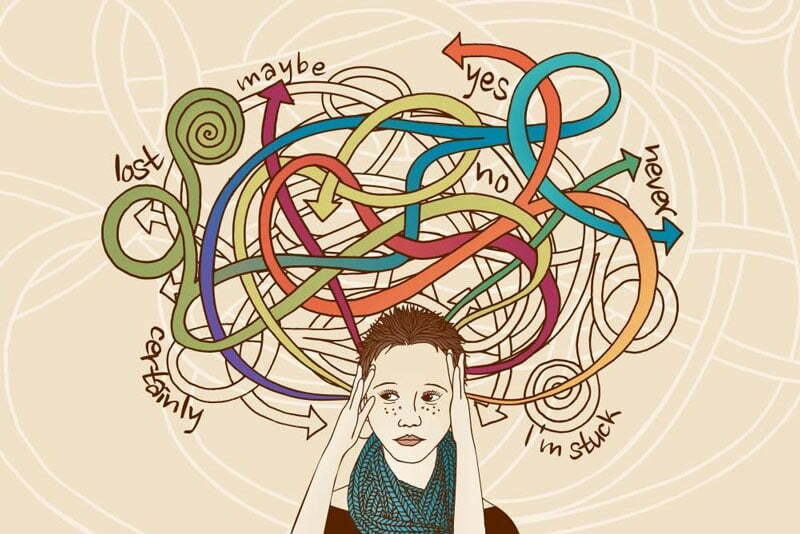
If you have a history of being trapped in toxic relationships, you may be caught up in the web of codependency. Codependent relationships are an unhealthy pattern of behavior where one person is excessively reliant on the other for their sense of self-worth and identity. Learn the signs and destructive patterns that keep codependent relationships thriving, as well as the steps you can take to break free from this cycle, break the chains, and feel more empowered. (Estimated reading time: 10 minutes)
“Even when I detach, I care. You can be separate from a thing and still care about it.”
– David Levithan
Movies are a great way to gain insight into ourselves. As we observe the characters on screen, we connect with their human experiences, flaws, and challenges. Watching actors allows us to confront and process our inner conflicts.
I recently saw “It Ends with Us.” The film highlights the damaging effects of domestic abuse and dysfunctional family patterns, sparking important conversations to increase awareness. Having encountered some of these themes in my life and through the people I’ve worked with, I found the movie incredibly meaningful and relatable.
This latest film adaptation of Colleen Hoover’s famous novel takes viewers on an emotional adventure, exploring the intricacies of love and the vital need to be aware of red flags in relationships. Through the touching experiences of the main character, Lily Bloom, played by Blake Lively, the narrative offers important insights into recognizing harmful behaviors, finding the strength to escape, and appreciating the value of self-esteem.
It can be hard to imagine why someone would choose to stay with a person who causes them pain. However, many overlook that how these relationships start can look very different from how they end up. This narrative effectively illustrates how women can find themselves in these compromised circumstances, serving as an unofficial guide on how to avoid becoming either a victim or a source of pain for someone they care about.
‘It Ends with Us’ focuses on physical abuse, but the ideas presented can be relevant to various forms of abuse or family challenges. Fortunately, I haven’t faced physical abuse myself, yet I found the narrative resonated with my family’s struggles with addiction, codependency, and emotional volatility.
If you’re on a journey to escape the grips of codependent relationships, remember that there is hope, and you deserve to be loved and valued in the ways you desire. Much like Lily Bloom, you’ll discover that the path to recovery can be a life-changing experience, empowering you to become stronger, more resilient, and courageous.
What are codependent relationships?

Codependent relationships can be complex and are often misunderstood. Essentially, codependency involves an unhealthy emotional and psychological dependence on someone else for self-esteem, identity, and overall happiness. In these relationships, a person prioritizes their partner’s needs, thoughts, and emotions, often neglecting their own needs and personal boundaries.
This kind of relationship dynamic is marked by a diminished sense of autonomy, an intense fear of being alone, and a deep urge to control or “repair” the other person. Partners in codependent relationships often struggle to make choices on their own, establish healthy boundaries, or prioritize self-care. They tend to become focused on the relationship, perpetually looking for validation, approval, and a sense of meaning from their partner.
Codependent relationships frequently arise in situations involving addiction, mental health challenges, or past trauma and abuse. Codependent individuals might unknowingly gravitate towards these dynamics to feel essential, discover a sense of purpose, or escape from their own unresolved emotional struggles. This unhealthy dependence can create a power imbalance, where one partner typically assumes the ” caretaker ” role while the other becomes the “dependent.”
Signs of a codependent relationships
Identifying the characteristics of a codependent relationship is the first step in understanding and tackling the problem. Typical signs of codependency are:
- An overwhelming need for approval and validation from your partner.
- Difficulty making decisions or acting without your partner’s consent or approval.
- Feeling responsible for your partner’s emotions, behaviors, or well-being.
- Sacrificing your own needs, desires, and boundaries to please your partner.
- Difficulty expressing your own thoughts, feelings, and opinions.
- Constantly seeking reassurance and affirmation from your partner.
- Experiencing panic or anxiety when separated from your partner.
- Enabling or tolerating your partner’s unhealthy behaviors, such as addiction or abuse.
Many of these behaviors can arise from a profound fear of being left behind and the belief that your value is tied to the relationship. People who are codependent might also face challenges with low self-esteem, difficulty in establishing their own identity, and an exaggerated sense of duty towards their partner’s happiness.
Codependency is a complex issue that exists along a spectrum, meaning its intensity can differ significantly among individuals. Regardless of the degree, even mild codependency can profoundly affect a person’s mental health, personal development, and quality of life.
The cycle of codependency
Codependent relationships often find themselves caught in a vicious cycle, where one partner’s needs are constantly placed above the others. This dynamic creates an ongoing power imbalance and a feeling of emotional entrapment.
The cycle usually starts with one partner’s overwhelming need for validation, approval, and a sense of purpose. This person often looks for a relationship with someone they think can meet these needs, frequently choosing someone who is dealing with their challenges, like addiction or mental health issues. The codependent partner takes on the role of the “caretaker,” focusing on “fixing” or “saving” their partner, often neglecting their own well-being in the process.
As the relationship develops, the codependent partner might struggle more and more with establishing boundaries, expressing their own needs, or taking time for self-care. They may become so wrapped up in the relationship that they continuously seek validation and support from their partner. This behavior can further deepen the other partner’s reliance on the codependent individual, leading to a cycle of control, frustration, and emotional distress.
Breaking the cycle of codependency can be challenging, as the emotional and psychological bonds often run very deep. Partners in codependent relationships might feel stuck, struggling to imagine life beyond their current situation. In their efforts to keep things as they are, they may enable or accept their partner’s unhealthy behaviors. This dynamic can severely impact their mental well-being, causing the codependent person to drift further away from their own needs and identity.
Understanding the root causes of codependent relationships

To successfully tackle and move past codependent behaviors, it’s essential to recognize the fundamental factors that lead to their formation. Here are the three root causes of codependency:
1. Childhood experiences and attachment styles.
Childhood experiences and attachment styles play a significant role in shaping codependency. When children grow up in situations where their emotional needs are often overlooked or where they face abuse, neglect, or trauma, they may develop a distorted sense of self-worth.
They might believe their value depends on how others perceive and validate them. This belief can create ongoing challenges in forming a solid, independent identity and building self-esteem throughout their lives.
2. Societal and cultural influences.
Many societies and cultures glamorize self-sacrifice, caretaking, and prioritizing the needs of others over our own. In certain cultures, individual autonomy and self-reliance might be seen as less important, with a stronger focus on the overall welfare of the family or community. This can lead to situations where codependent behaviors are not only accepted but may also be encouraged.
3. Addiction, mental illness, or other challenging circumstances.
Codependency can intensify when one partner struggles with addiction or mental health, compelling the other to “rescue” or “help” them. This can create a codependent dynamic that becomes harder to escape.
By exploring the fundamental reasons behind codependency, individuals can start to identify the emotional and psychological elements that have led to these unhealthy behaviors. Gaining this insight is an essential initial step in freeing oneself from the grips of codependency and fostering healthier, more satisfying relationships.
The impact of codependent relationships on mental health
The effects of codependent relationships on mental health can be significant and far-reaching. People caught in unhealthy patterns frequently face various emotional and psychological difficulties, such as:
1. Anxiety and depression: Codependent individuals often experience ongoing anxiety, as they frequently worry about their partner’s well-being and the overall stability of their relationship. This constant concern can contribute to feelings of depression, especially when their self-worth becomes heavily tied to the relationship itself.
2. Low self-esteem and self-worth: Codependent partners frequently struggle with low self-esteem and a skewed perception of their own worth. They may feel their value is tied to their ability to “fix” or “rescue” their partner, leading to significant self-doubt and a persistent feeling that they aren’t enough on their own.
3. Trauma and emotional abuse: Codependent relationships often create an environment where emotional abuse can escalate. The person who is codependent might put up with or even support their partner’s damaging actions to keep the relationship intact. This dynamic can result in deep emotional trauma and a strong feeling of betrayal and violation.
4. Difficulty setting boundaries: People with codependency frequently find it challenging to establish and uphold healthy boundaries, not just in their relationships but also in other areas of their lives. This difficulty can result in feeling constantly overwhelmed, exhausted, and even resentful towards their partner and other important people.
5. Substance abuse and addictive behaviors: To manage the emotional distress that often comes with a codependent relationship, some people might resort to substance abuse, gambling, or other addictive activities as a way to escape or soothe their feelings.
The long-term effects of codependency can be harmful, as a person’s mental, emotional, and physical health may suffer significantly. It’s essential for anyone caught in these unhealthy patterns to reach out for professional assistance and support to escape the cycle and regain their independence and self-esteem.
How to break free from codependent relationships patterns

Breaking away from the cycle of codependency can be a tough and very personal experience, yet it’s an essential move towards regaining your independence, self-esteem, and overall health. The journey to escape codependent behaviors includes several key steps.
1. Develop self-awareness.
The first step to overcoming codependency is to gain a better understanding of yourself, your needs, and the emotional challenges that have led to codependent behaviors. This process might include self-reflection, journaling, or working with a therapist or counselor for support.
2. Set boundaries.
Establishing and maintaining healthy boundaries is crucial in breaking free from codependency. Here are some ways to do it:
- Learn to say “no”: Saying “no” to requests or demands that compromise your own well-being is a fundamental aspect of boundary-setting.
- Respect the boundaries of others: Healthy boundaries are a two-way street. In addition to setting and maintaining your boundaries, respecting your partner’s boundaries is essential.
- Establish physical and emotional space: When necessary, creating physical and emotional distance from your partner can be a powerful tool for maintaining healthy boundaries.
3. Practice self-care.
Healing and self-care are essential for breaking free from codependent patterns. As people reclaim their independence and sense of self-worth, it’s crucial that they also prioritize their own well-being by:
- Developing a strong, positive relationship with yourself: This may involve engaging in regular self-reflection, journaling, or other reflective practices that help to uncover and address the underlying emotional issues and cultivate self-compassion.
- Incorporating wellness practices and activities: Adding physical exercise, mindfulness, meditation, creative pursuits, or simply taking time for relaxation and leisure into your routine.
- Cultivating supportive, non-codependent relationships with friends and family members: These individuals can offer a fresh perspective, emotional support, and encouragement as you navigate the challenges of getting over codependency.
4. Create a support network.
Building a circle of supportive friends and family who aren’t codependent can play a crucial role in overcoming codependent behaviors. They can offer new insights, emotional support, and encouragement as you work through the ups and downs of personal development and transformation.
5. Seek professional help if needed.
For many people, escaping codependency often requires seeking help from a mental health expert, like a therapist or counselor. These professionals can assist in uncovering the underlying reasons for codependency, creating plans to break unhealthy habits, and offering a supportive, judgment-free environment for personal development and self-discovery.
6. Embrace uncertainty and change.
Breaking away from codependent relationships usually requires accepting uncertainty and recognizing that change can be challenging and unsettling. By embracing this discomfort and having faith in the often messy process of personal evolution, we can ultimately become stronger, more resilient, and better equipped to build healthy, satisfying relationships.
Breaking free from codependency is not easy, but it is a necessary step toward reclaiming one’s sense of self, autonomy, and overall well-being. Like walking through a dark, perilous forest, we might feel lost and scared initially, but if we keep going, we’ll eventually find an open field where we can bask in the warm glow of greater freedom, self-love, and healthier, fulfilling relationships.
All my best on your journey,
Seline

Questions for you: Are you prone to codependency? If yes, what impact does it have on you, and how would your life change if you could break free from codependent relationships?
Did you like this post? Sign up below, and I’ll send you more awesome posts like this every week.

Off this one hit home for me. Still recovering form a co-dependant relationship that recently ended. So this was a timely piece for me to find. Thanks for sharing!
I know people who have had to deal with this. You have my thoughts and all the encouragement Sally. I know this cannot be easy, but I know you can do it!
Been there and done that, too- not a fun place to be! But I will say as someone standing on the other side of it you CAN get over it, and life IS better once you face and deal with the co-dependent nature.
I will try and take your words to heart here Cynthia, because I don’t feel like this is ow it going to end up for me. But I guess all we can do is keep pressing on and holding on to see what is going to happen.